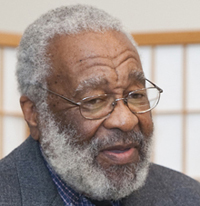The Violence King Faced
 |
| Historian Vincent Harding |
Today, on the 50th anniversary of the March on Washington, let us consider this: Did Dr. King espouse nonviolence out of fear? Was he naive about the wisdom of nonviolence? Not at all. In fact, he faced extreme violence early in the movement, and remained committed to aggressive nonviolent action as the only means of true change in the United States, and in the world. Vincent Harding explains in America Will Be!, his new dialogue with Daisaku Ikeda:
On January 30, 1956, King's home was bombed. I believe this event hardened King's resolve, and this is also what deepened the people's respect for him. It would become a magnificent opportunity that would test his philosophy of nonviolence. After the bomb blast people were outraged, and many rushed to King's house, some bearing weapons, both to protect him and to strike out against whoever had committed this violent act. King then took this wonderful opportunity to remind his supporters that vengeance was not the basis on which their struggle must be carried forth, and he called upon them to lay down their arms and to fight with courage rather than with instruments of brutality. King took every opportunity to call upon the people to rise to a higher level of humanity than that of the oppressors.This context makes King's dream all the more remarkable. As Dr. Harding says, the true meaning of Martin's dream is that he maintained faith in it in the face of harsh opposition. It should be noted that in September 1963, just a few weeks after the March, four young African-American girls died when a church in Birmingham was bombed. To call for brotherhood and sisterhood amid this carnage is one of the great spiritual achievements of our time.
Here's a post I wrote a few months ago on the wisdom of nonviolence, called Nonviolence, Pragmatism, and the Fantasy of Revenge.
Comments
Post a Comment